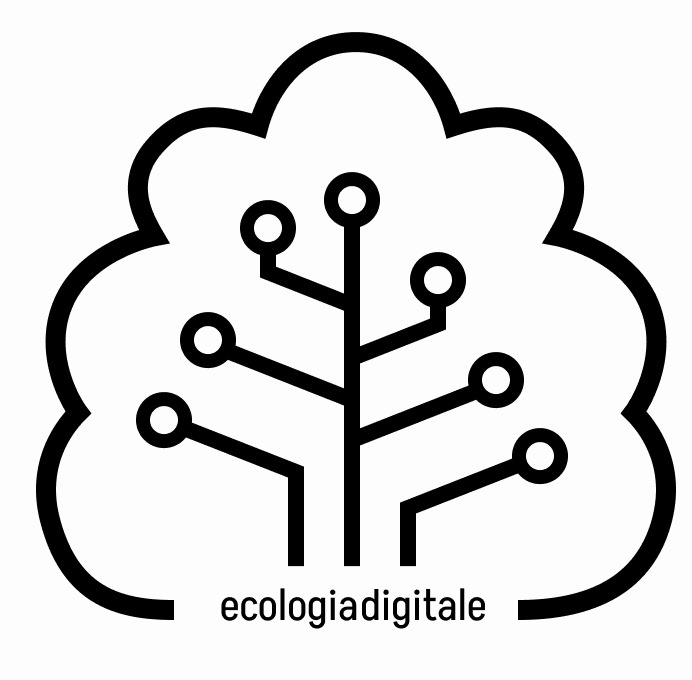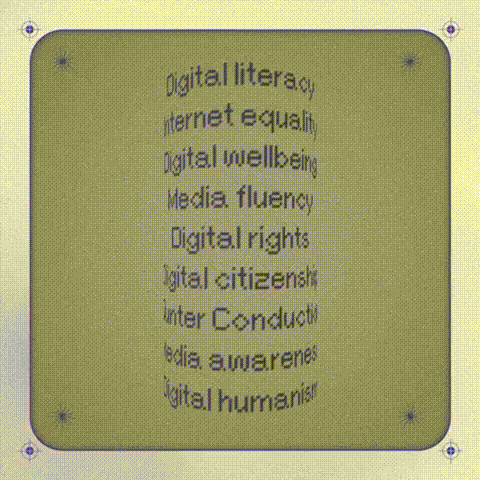You are witnessing an unprecedented revolution. A silent revolution made of shiny screens and incredible alternative worlds. The Digital, the Web, the Internet: no matter how you call it, still a very special place; search and you will immediately find, ask and you will immediately get.
Seems simple right? Well, we believe the contrary.
We want to question what surrounds us, we want to understand it and to influence it. And we want you to do the same.
So, let’s start with a couple of questions: Do I believe what I see on Google? Why is a result on the top of my search? Why was that video suggested to me? Am I really in control of my screen time? Do I understand what rights I have in the digital world, and which ones I should have but I don’t yet? Is a social media subscription just a subscription or a political act?
And what if we told you, you are the very centre of this revolution?
What if you could shape it all, just with your ideas, actions and choices? What if we told you, it all eventually comes down to a single click?
Here we present you 9 concepts that are close to our hearts, and although they seem complicated at first glance, they describe things that we all experience every day.
Much more than empty words: our goals and our hope.
1. Digital literacy
Am I able to correctly navigate the Internet? Do I even understand what “navigating” means? Do I know how to determine the validity of a source? Can I fact-check and debunk a fake news? Am I protecting my privacy the right way? These are abilities that we acquire (or should acquire) in order to use technological devices. We should all understand that communication technologies require both cognitive and technical skills which are crucial for our awareness of and in the Digital. You might not recognize it immediately, but thanks to your digital literacy you can move smoothly in the TechWorld.
2. Algorithm neutrality
M: “Why am I yet not famous?”
Q: “Cause you SUCK…”
M: “Thank you, it’s always a pleasure talking with you”
Q: “Your welcome”
M: “But I was serious, I mean… Why people don’t give a fuck about my TikTok dances?”
Q: “Because you…”
M: “Ahrg! I’ve got the concept, thank you. But now please let me explain my idea, I’m sure you’ll admit that I’m right at the end”
Q: “You’ve got my attention”
M: “The Internet and everything based on it has a lot of algorithms that handle the users in every single moment. Every research on Google, on Facebook, on Twitter, on Bing, in the Deep Web, everything is controlled by algorithms. If I open a new website with a new domain and I search it on google probably it won’t appear until the third pages, if I’m lucky. But why? I created the site, I knew the title, I knew the contents… Why doesn’t it appear? The problem is that…”
Q: “Wait a moment! My favorite youtuber has just uploaded a video, I’m gonna watch it now. Omg she is playing a game and she got 10000 views in less than 5 minutes!”
M: “And doesn’t that seem strange to you?”
Q: “No, why? She is very good at it.”
M: “Yes, I don’t mean to say that she isn’t good enough. But every minute are published a thousand of contents from all over the world, how can this video, without any trouble, become the most viewed?”
Q: “Okay, that’s a more interesting question compared to why you are not yet famous. Go on!”
M: “The problem is that algorithms create inequality. There’s no meritocracy on the Internet. Rules the law of the strongest. It is exactly the same as in life: the rich get richer (of likes, views, followers, money), the poor get poorer.”
Q: “But how can we solve it?”
M: “There are some possibilities but the only thing we should really do is stop using browsers and platforms that create inequality.”
Q: “But if I’m not wrong there is an inequality either between these platforms and the ones that are trying to preserve equality.”
M: “Yes, unfortunately you’re right. One of the difficulties is that few people are conscious about this problem, and as every single change, it needs a lot of minds asking for it.”
Q: “Well, I’m ready! I want this change.”
M: “Yes, me too. So maybe I’ll become famous on tiktok.”
3. Digital wellbeing
Are you actually doing something on the Internet that affects you in a positive way or are you just distracted? Statistics tell us we stay an average time of 6 hours on our phones and check it about 50-80 times per day, we’re basically in a relationship with it. But is it a healthy or a toxic one? Are you getting all the benefits and good things from it? Does it help us achieve our goals or does it interrupt and upset us? Are we really in control or are we being controlled? To achieve digital wellbeing, we should try to get as many benefits as we can, while limiting the side effects to the minimum. Does it sound good to you?
4. Media fluency
You know you can’t just trust everything you read online right? Don’t be fooled by your personalised search engine and the media bubble it comes with! Think! Apply critical thinking and listening to what you read and what you post online, it’s a multisensory environment and if you don’t learn to separate the actual message from the medium that communicates it you’ll end up believing stuff like conspiracy theories and fake news!
5. Digital rights
Digital rights are all those legal rights that cover the creation, use and publication of digital materials; however, they also consider the use and access to all the related devices – such as computers, phones and all other instruments that allow us to communicate. They should be seen as an extension of human rights, and since we live in the Internet era they cannot be ignored, and indeed must be known and preserved as they affect our daily lives, from our privacy to our freedom of expression.
6. Digital citizenship
We live in a society, an aggregate of people living together in a more or less ordered community, where we express ourselves and interact with others, with laws and duties and where we do more or less productive tasks. In a time where technology is so embedded in our lives, what makes us think there isn’t a digital version of our society, of which we are also citizens? What kind of citizen do you want to be?
7. Digital Counter-Conduct
The key feature of counter conduct is that it finds politics in everyday life, such as your social media usage or the way you communicate with others or how you stay informed. It is defined as any kind of resistance against early conceptualizations of power and it shows what this everyday politics of resistance carries with it and how we can critically interrogate the politics and ethics of our everyday life. An example? Subscribing to Instagram or to Twister is not the same. You never heard of the second? No surprise. Twister challenges the model of centralised tech companies like Instagram, giving the data control and the power back to its users. So choosing the less popular alternative over the other is like going to vote, is like saying no to the system, is what we call digital counter-conduct.
8. Media awareness
Everytime you are looking at a screen, chances are you’re looking at images and other different types of content, do you have any idea how much? An average of 11 hours interacting with media! It would be foolish to think that all that content on a daily basis doesn’t influence us, for better and for worse. So let’s ask ourselves: with which method and criteria am I choosing it? For what reason? What type of media and content is it? What effects does it have on me? Am I really interacting with it intentionally and consciously, or am I feeling overwhelmed and agitated?
9. Digital humanism
Your connection is unstable
B: What are you fucking talking about? My connection is not so good …
A: Digital humanism
B: What the hell is that?
A: Digital humanism is the concept …
B: Oh, I don’t wanna a lecture! Sorry man
A: But it’s super easy, trust me
B: Okay, okay. Come on! I’m listening. I can’t run away, I’m in quarantine …
A: For this reason I was talking to you about technologies, and about digital humanism. It’s about you and me, us. Without technologies, we couldn’t talk to each other now, for example. We are not apart from the technological progress
B: And so?
A: Can you imagine a period like this without technologies? They are our best friends.
B: What are you trying to explain?
A: We are the centre of technological progress. Isn’t It exciting? Technologies exist to help us, to communicate as we are doing right now. They would be useless for themselves.
B: Mmhhh … Luckily I can switch you off now. Bye!
The call is over. Value the quality.
-DE TEAM


Rispondi